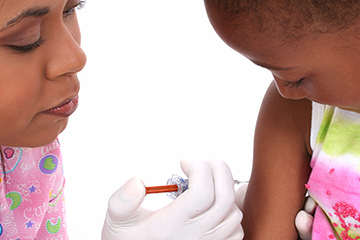Integrated Management of Childhood Illnesses (IMCI)
| Description: |
The Integrated Management of Childhood Illness (IMCI) programme helps improve child care practices by involving communities at the household level in all efforts to reduce preventable childhood diseases, especially in children less than 5 years of age. Integrated Management of Childhood Illnesses (IMCI) is a strategy developed by the World Health Organisation's (WHO) Division of Child Health and Development and UNICEF for the care of children at first-level health facilities. It’s been introduced in more than 30 countries around the world to address morbidity and mortality in children under 5 years. Sick children often arrive at primary health care facilities with a number of medical related issues and have to be managed in an integrated manner at home and at the clinic. This is why the strategy focuses on the child as a whole, instead of on a single disease or medical condition.
Every year, about 12 million children in developing countries die before they reach their fifth birthday. This is due to perinatal problems and many during the first year of life, and seven in 10 of these deaths are due to 5 main diseases, including:
The Western Cape Department of Health’s guidelines have been developed to complement the WHO's list and adapt it to include priority conditions affecting children in the Western Cape specifically. Illnesses that are managed from when the child is born to 5 years old, include:
Treatment: Primary health care staff are trained to identify children who have these illnesses. Sick children are assessed according to their symptoms and signs. Treatment is given if necessary, and as the caregiver or parent you’ll be counselled and advised on the follow-up care for your child.
|
| Instructions: |
If you’re a first-time visitor to a health facility, you’ll be asked to fill out a form and a folder will be opened. You’ll need to bring:
Midwife Obstetric Units or primary health care clinics and centres offer integrated management of childhood illnesses. If you or your child is referred up the line, you’ll be sent to an urban or rural regional hospital, or a tertiary hospital. Please contact your nearest Clinic for more information. |
| Provided At: |
These facility categories: |
| Government Body: | (Western Cape Government) |
| Price: |
Services are free of charge at primary health care facilities.
|
- Integrated Management of Childhood Illness (Public Information) (File type: pdf; size: 75.08 KB)
- Integrated Management of Childhood Illnesses in the Western Cape (Public Information) (File type: pdf; size: 57.73 KB)
- Tips for Parents Whose Child is Suffering from Diarrhoea (Public Information) (File type: pdf; size: 262.54 KB)
- Integrated Nutrition Programme (Service)
- Child Abuse Treatment (Service)
- Key Points about HIV/AIDS (Public Information)
- The South African Tuberculosis Control Programme Practical Guidelines (Guidelines, Manuals and Instructions) (File type: pdf; size: 422.5 KB)
- Immunisation (Service)



